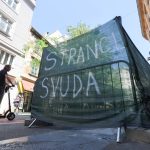No volleyball today, but more protests against the Slovenian wire fence.
The President of the Italian Province of Gorizia Enrico Gherghetta led a peaceful protest against the Slovenian wire fence at the Kaštel/Dragonja border crossing between Slovenia and Croatia which brought together about a hundred people, including representatives of municipal authorities in Croatia and Slovenia, who demonstrated their opposition to building fences in Europe by putting bouquets of flowers on the razor fence, reports Index.hr on January 8, 2016.
“Europe is closing, and the European idea has failed”, said the Italian politician who was born in Rijeka, adding that this negative process is symbolized by the razor-wire fence built by the Slovenian government, which claims that it is a defence measure for the Schengen Europe. “From the idea of Europe as a space of openness and expansion, we have come to the process of closing and the idea of social protectionism, which is a false illusion”, said Gherghetta.
Member of Croatian Parliament Furio Radin warned that the wire is significantly easier to put up than to remove, and that its removal will take a long time, although the Slovenian government at a recent meeting agreed to consider the demands of local authorities in the Slovenian coastal areas and Istria to remove the wire fence as soon as possible because it is harmful to nature, people and the economy.
There were no refugees recorded in Istria and the Slovenian coastal areas during last and this year, but the Slovenian authorities fear that could change in the spring, and point out that the wire was put up pre-emptively. For more than two months, migrants and refugees have been arriving in Slovenia by trains, and they are being transported further to Austria by trains and buses.
Slovenian media report that, due to reduced inflow of refugees to Slovenia, foreign police officers, who came to help their Slovenian colleagues defend the Schengen border, have begun to leave. Austrian and Latvian policemen have completed their missions and have already returned to their countries.








